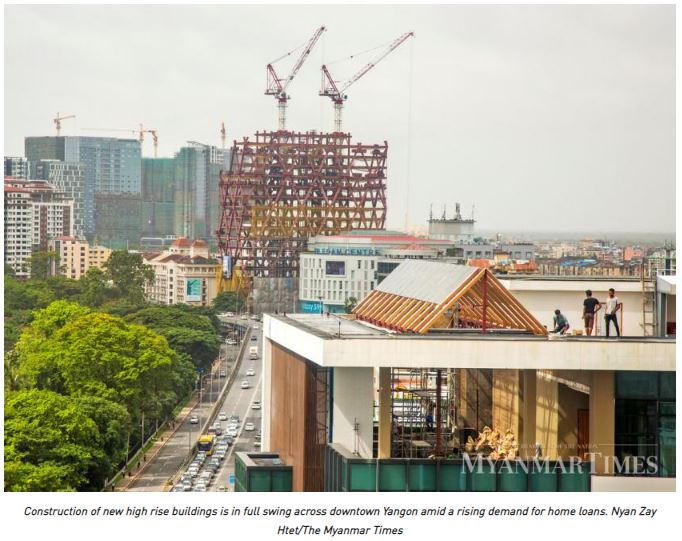Myanmar: Rising demand for home loans could stabilise property market
Housing loans and repayments of those loans in monthly instalments have begun to flourish in Myanmar’s real estate market since the beginning of this year, as more construction companies and real estate developers collaborate with banks to make home ownership more accessible.
These days, banks are offering home loans at a specified interest rate and tenures of 15 years for ordinary apartments and 25 years for condominiums. In the past, payments were mostly made in cash.
The government has been building low-cost or affordable housing, but the homes can sometimes still be beyond the reach of those who need them the most, said U Nay Min Thu, managing director of property website iMyanmarHouse.com.
“The people who actually want to purchase low-cost housing are not able to do so and instead [the property] falls into the hands of speculators. And incidents where these speculators then rent out the units or resell them for a profit are seen in the market,” said U Nay Min Thu.
With loans now available, more are able to buy homes from not only private developers but also the government.
Foreigners absent
Despite those positive developments and the recently enacted Condominium Law, foreigners remain largely absent from the local residential market.
Under the new law, which was passed in January 2016 and bylaws enacted in December 2017, foreign buyers are allowed to buy up to 40pc of a condominium development. The law also requires a condominium management committee to be formed to handle all registrations and requirements associated with foreign property purchases
So far, no condo units have officially been sold to foreigners because a condominium management committee has still not been formed, according to iMyanmarhouse.com.
 Demand for residential property in Yangon is rising. Phoe Wa/The Myanmar Times
Demand for residential property in Yangon is rising. Phoe Wa/The Myanmar Times
Concerns linger
Meanwhile, concerns among local buyers remain, one of which is the possibility that there might be changes in government policies if they obtain a 15-year mortgage with a 13pc interest rate. If interest rates should drop, borrowers would be stuck with the higher interest rate on their loans.
The banks have given verbal promises that the loans they issue will be tied to the prevailing interest rates, but this is not stated explicitly in the current property loan agreements, said U Nay Min Thu.
Even as the spread of home loans increases the hopes for the middle-class to own homes, high interest rates are making them hesitant to do so.
Ma Lae, who is currently considering buying a house in South Okkalapa Township, said she is hesitant to buy a house although she has already saved money for it because the amount of interest she will have to pay can equal the cost of a house.
“If possible, I want to buy a house. Currently, I haven’t bought it yet because the interest rate is too much and I would have to pay about K300,000 per month after paying the down payment,” she said.
Higher demand
On balance though, there has been an increase in property buyers seeking to obtain loans since the start of the year. This is because the banks will handle all requirements of home ownership on behalf of the buyer, said U Kaung Thu Win, founder and director of the property website ShweProperty.com.
If a buyer purchases a unit on his own, he will have to personally take care of ownership and legal procedures.
“In the past, if someone wanted to buy a home on just their salary they needed to show ownership documents for the unit. But the new model introduced by the banks allows a person to easily buy a unit with just an approval letter and proof of salary of not less than K400, 000,” he said.
At present, fully constructed homes and ones with completion of above 75pc can be purchased under a loan. Applications for home loans can take from two to four weeks and the people move in after making a 30pc down payment.
“When people get used to it and if every citizen has stable income or enough assets or financing, they can own a house. It is a promising plan also for the developers,” U Kaung Thu Win said.
Others are choosing to take on bank loans as they can’t bear the stress of being a tenant. Instead of paying a lump sum in rent every six months, they can eventually own a house by paying monthly.
“Despite the monthly loan repayments, we can live in our own house. What we have to pay is the same as renting but we have an expectation that when the time comes, we own a house,” said Ma Thuzar, who bought a house with a bank loan.
In Myanmar, in addition to a lump sum in rent every six months, frequent moves can only be avoided if a tenant is on good terms with the landlord, as many property owners are not willing to rent out their properties for more than three or four years. That is why, during her 10 years in Yangon, Ma Thuzar has moved at least four times, she said.
All that will soon change as the housing market develops and stabilises.
This year, AYA bank has already launched its home loan plan and any Myanmar citizen who is 20 years of age or older can apply for it.
The bank is offering loans for some 2400 apartments ranging in price from K20 million to K200 million built by its partner construction companies, U Myint Zaw, managing director of AYA Bank told The Myanmar Times.
“Banks are the main drivers of the real estate sector. It is rare for people to fully pay the price of a home even in more developed economies. People usually buy homes with loans,” U Kaung Thu Win said.
Source: https://www.mmtimes.com/news/rising-demand-home-loans-could-stabilise-property-market.html


 English
English




